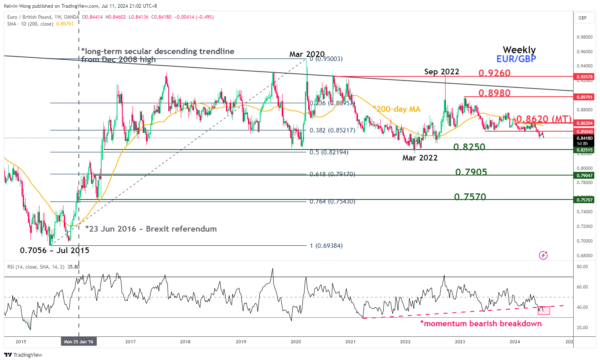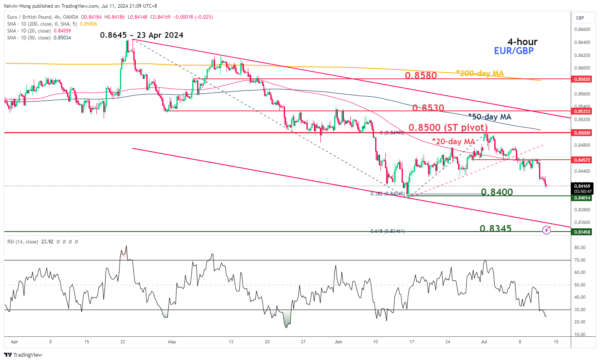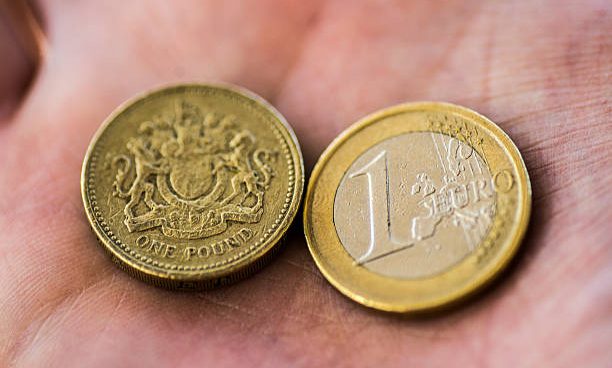- EUR/GBP has resumed its downward trajectory since the start of the year, now trading close to a 2-year low at 0.8320.
- Unfavourable political environment in France versus a newly formed Labour-led UK government that favours pro-growth policies may see further underperformance of the Euro against the Pound.
- EUR/GBP continues to oscillate within a short-term downtrend phase with key resistance at 0.8500.
Since our last publication, the price actions of the EUR/GBP have inched lower below the prior 0.8540 key short-term pivotal resistance and hit the 0.8440 short-term support as highlighted in our report.
The EUR/GBP cross pair continued to drift lower to print a recent intraday low of 0.8397 on 14 June before it traded sideways and inched lower ex-post UK general election and the second round of the French legislation election.
The Euro has started to lose its shine against the Pound

Fig 1: EUR/GBP major trend as of 11 Jul 2024 (Source: TradingView, click to enlarge chart)
After the outcome of the Brexit referendum held on 23 June 2016, the EUR/GBP cross pair gained by 25% in the next four years and rocketed to a high of 0.9500 in March 2020 on the onset of the Covid-19 pandemic.
One of the key primary drivers of the underperformance of the GBP against the EUR during the period from 2016 to 2020 has been the negotiation process of Brexit which was both politically challenging and deeply divisive within the UK that led to two snap elections in 2017 and 2019.
Another episode of GBP’s significant underperformance was from August 2022 to September 2022 under the premiership of former UK Conservative Party Prime Minster Liz Truss sparked a mini-crisis in the Glit market due to the proposed unfunded mini-budget where EUR/GBP spiked by 10% within a month to print a high of 0.9278 on 22 September 2022.
Since the start of the year, the EUR/GBP has traded lower below its 200-day moving average (see Fig 1), and it is now hovering at close to a 2-year low of 0.8420 at this time of the writing.
Unfavourable political environment in France with a lack of pro-growth initiatives may see a shift towards UK financial assets
A change in the political climate in the UK and EU seems to be the driving force again; the newly formed UK government under the Labour Party has advocated growth policies via public-private partnerships that in turn lower the chances of a tax hike or cut fiscal spending to balance the budget books; a shift away from its traditional socialist roots.
On the flip side, the political climate of France is now in limbo as the second round of the French legislation election has led to a hung parliament with the far-left socialist alliance New Popular Front managed to take the top spot from the initial leading far-right National Rally but without a clear absolute majority to push for its aggressive fiscal spending policies coupled with higher taxes on businesses and wealthy people.
However, it will still be a challenge for French President Macron’s centrist alliance which has taken the second position in the French parliament to push out pro-growth policies and allow the current 5% budget deficit to shrink towards the 3% limit set up by the EU standard due to loggerheads with the far left.
Therefore, a lack of new growth fiscal initiatives from France, one of the economic growth engine pillars in the EU is likely to dampen the prospects of the Eurozone financial assets in favour of UK assets that also have a lower valuation.
Watch the 0.8500 key short-term resistance on EUR/GBP

Fig 2: EUR/GBP short-term trend as of 11 Jul 2024 (Source: TradingView, click to enlarge chart)
In the lens of technical analysis, the EUR/GBP has continued to trade within a short-term downtrend phase as price actions continue to oscillate within a minor descending channel since the 23 April 2024 high of 0.8645 and below its 20-day moving average (see Fig 2).
If the 0.8500 short-term pivotal resistance (also confluences with the downward slopping 50-day moving average) is not surpassed to the upside, the EUR/GBP may see a break below its recent14 June minor low area of 0.8400 for a further potential impulsive bearish down move to expose the next near-term support at 0.8345 (also the lower boundary of the minor descending channel) in the first step.
However, a clearance above 0.8500 negates the bearish tone for a minor squeeze up to see the next intermediate resistances coming in at 0.8530 and 0.8580 (also the key 200-day moving average).









